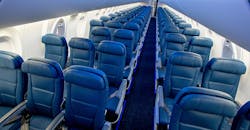Bombardier Set to Sell Its A220 Share
Airbus SA and Bombardier Inc. are expected to announce that Airbus will acquire its partner's stake in the C Series Aircraft Limited Partnership, a joint-venture established in July 2018 once Airbus acquired a 50.1% stake in the C Series program — now reestablished as the A220 series — with Bombardier retaining a 31% share in the narrow-body jet program it developed. A 19% would remain in control of a Quebec-controlled investment fund.
No cost or other terms has been indicated for the share transfer. The deal is expected to be announced prior to the two companies’ annual earnings are reported on February 13, according to several reports.
Bombardier reportedly invested over $6 billion to develop the C Series/A220, and the jet’s commercial debut came in July 2016. The twin-engine aircraft are sized to carry 108-133 passengers (A220-100) and 130-160 passengers (A220-300), which “perfectly complement(s) Airbus’ existing best-selling A320neo family,” the OEM stated when it rebranded the program in 2018.
A220 series jets are powered by Pratt & Whitney PW1500G geared turbofan engines, which promise “at least 20% lower fuel-burn per seat compared to previous generation aircraft,” according to Airbus.
Selling its A220 stake would effectively close-out Bombardier's position in the commercial aviation market. In October 2019 it agreed to sell its aerostructures business to Spirit AeroSystems Holding Inc. Earlier, in June 2019 Bombardier sold its Canadair Regional Jet program to rival Mitsubishi Heavy Industries for $550 million plus liabilities estimated at $200 million.
Bombardier's new business model is centered on railroad and its Global business aircraft series.
Airbus acquired the A220 stake for a nominal C$1.00 plus the acquisition of program liabilities.
The A220 program has performed well since the Airbus takeover in 2018. Currently, Airbus records 658 total orders for A220 aircraft, including from Delta Air Lines, JetBlue, and Moxy, the start-up airline venture led by JetBlue founder David Neeleman.
The A220s are assembled at Mirabel, Quebec, and Mobile, Ala., where Airbus has started expanding its operations to address the order backlog.
Relatedly, the Alabama site has been exempted from the list of tariffs proposed by the Trump Administration in response to the World Trade Organization's ruling in favor of the U.S. case for $7.5-billion worth of counter-tariffs on industrial goods from the European Union and certain EU member states — a case that stems from a long dispute between Airbus and Boeing Co., each alleging the other benefitted from government subsidies.
